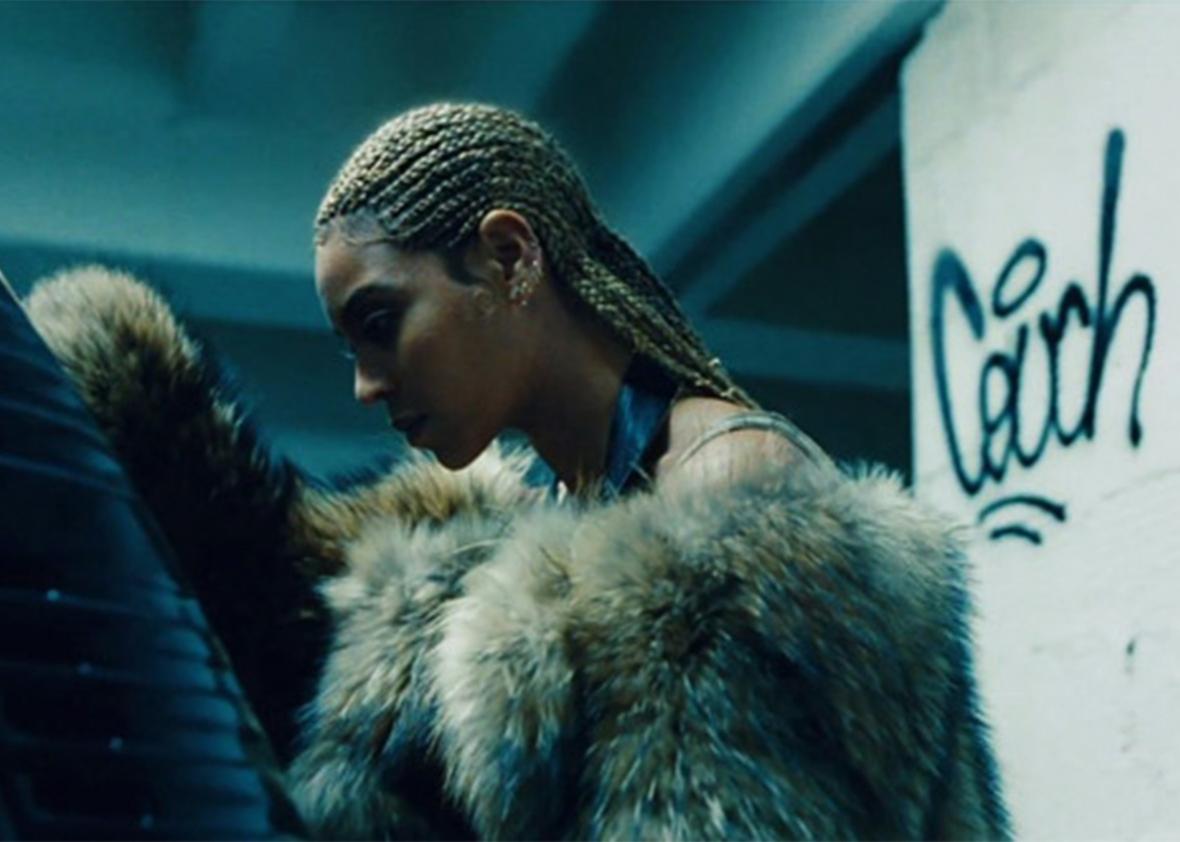Although it couldn’t match the shock of hearing Beyoncé take her husband to the woodshed over his apparently infidelities, one of Lemonade’s bigger surprises was the inclusion of the lilting “Daddy Lessons,” the Texas native’s first straight-up country song. She’d flirted with country as far back as 2006’s “Irreplaceable,” which songwriter Ne-Yo patterned after hits by Shania Twain and Faith Hill, even joining Nashville hitmakers Sugarland for a joint version on the American Music Awards. But there’s nothing coy about “Daddy Lessons”’ embrace of the big-hat genre. Before she starts singing, Beyoncé murmurs “Texas” twice, just so you’ll know where she’s coming from.
The country-music establishment, however, has been ambivalent about returning the embrace. In a post called “What’s So Country About Beyoncé?”, CMT’s Alison Bonaguro sniffed, “It doesn’t sound like a country song to me, she didn’t cut it at a studio in Tennessee, and it certainly wasn’t written by a group of Nashville songwriters.” The Beyhive promptly took Bonaguro to task, tweeting pictures of Beyoncé in cowboy hats and pointing out the veiled racism in her boundary policing. As the Texas Observer’s Andrea Grimes wrote on Twitter, the subtext of Bonaguro’s post is that Beyoncé “is trying to appropriate country, a genre stolen from Black folks by white folks.”
There have always been black artists singing country music, but country’s institutions have been slow to recognize them: When he was invited to the Grand Ole Opry in 2012, Darius Rucker brought its lifetime total of black members to three. In 1965, Ray Charles’ Modern Sounds in Country and Western Music became the first country album to go gold on the Billboard charts, but country radio shunned its songs. Even contemporary country stations seem unsure what to do with “Daddy Lessons.” Orlando’s K92.3 gave the song a trial spin, but when listeners made their dislike known on the station’s Facebook page—one wrote “That’s the last person that needs to be on county radio !!!!”—the DJ backpedaled like Wile E. Coyote: “i’m just throwing it out there for you to hear it … we aren’t going to add it to our daily song list … just wanted to get your thoughts on it!”
Without wading into the murky waters of what constitutes “real” country music, there’s no question that “Daddy Lessons” sounds as much like country as many of the genre’s biggest contemporary stars: It’s easy to imagine a version sung by Carrie Underwood or Miranda Lambert, one that would generate substantially less anxiety about whether or where it belongs. Greg Sacidor of Philadelphia’s WXTU wrote, “It may not be the most traditional country song, but certainly ‘Daddy Lessons’ would not be out of place on country radio.” Saving Country Music’s Kyle Coroneos put “country” in scare quotes when describing the song, but even he admitted that it’s “still more country than Sam Hunt.”
Enter Dixie Chicks, whose performance of “Daddy Lessons” during Saturday’s concert ought to settle the debate once and for all:
The Chicks have, of course, had their own troubles with the country establishment after singer Natalie Maines denounced the U.S. invasion of Iraq onstage in 2003, not unlike the controversy generated by the purported anti-cop subtext of Beyoncé’s “Formation” video earlier this year. But when they first appeared on the scene, their music was hailed as a return to country’s roots: They played banjo and fiddle on stage, and their songs denounced pop-leaning country stars who “sound tired but they don’t sound Haggard.” For them to cover “Daddy Lessons” and to play it almost entirely on acoustic instruments, in an arrangement that could have graced the Opry’s stage a half-century ago, ought to render the entire debate moot. Of course, it’s also a smart way for the Chicks, who haven’t released a new album in a decade, to get themselves back in the news, but there’s no reason smart PR moves can’t be potent statements, too.
